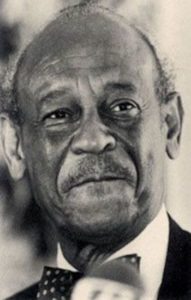
Isaiah Newman
Isaiah Newman was born on this date in 1911. He was a Black clergyman and civil rights leader.
He was born in Darlington County, SC. Isaiah DeQuincey Newman was the son of the Reverend Melton C. Newman and Charlotte Elizabeth Morris. He attended Williamsburg County public schools and Claflin College and was ordained in the United Methodist Church (UMC) in 1931. Three years later, he received his Bachelor of Arts degree from Clark College in Atlanta and his divinity degree from Gammon Theological Seminary in Atlanta in 1937. While serving as a student pastor, he met and later married Anne Pauline Hinton of Covington, Georgia. They had one child, Emily.
For over forty years, he served UMC churches in Georgia and South Carolina and held key positions with their South Carolina Conference and General Conference. As a member of the UMC Merger Committee in the 1970s, he played a major role in ending segregated congregations. Early in his ministry, Newman identified the struggle for racial equality as a matter of spirit and social and political concern. He developed a preaching style that linked morality with practicality, especially regarding race relations.
In 1943, Newman helped organize the Orangeburg branch of the National Association for the Advancement of Colored People (NAACP). He contributed to the NAACP in various capacities, including serving as South Carolina field director from 1960 to 1969. Newman was a gentle, self-effacing man, patient and slow to anger, who preferred diplomacy to confrontation. A tenacious advocate for simple justice in race relations, he also believed in non-violent protest as the most effective means for achieving the goal.
Newman was the protest movement's chief strategist and negotiator at the conference table, becoming the "unofficial liaison" between Blacks and the white power structure. South Carolina dismantled its structure of legalized segregation with a minimum of violence, in considerable measure, because of its leadership and dedication to peaceful change. In the 1940s, Newman helped found the Progressive Democratic Party, an effort to change the racial policies of the regular Democratic Party.
He became a trusted confidant of state leaders such as U.S. Senator Ernest Hollings, governors Robert McNair and John West, and a delegate to several Democratic national conventions. Extending his ministry into the lives of ordinary people, Newman worked to improve the condition of Blacks and whites in rural South Carolina. Housing, medical care, the environment, aging, vocational education, and social services, in general, were among the concerns for which both state and private agencies sought his counsel.
Honorary degrees from state colleges and universities further acknowledged his achievements, and the University of South Carolina established a chaired professorship in social work in his honor. On October 25, 1983, Newman became the first African American since 1887 to serve in the state senate. Newman served with distinction on several senate committees until ill health forced him to resign his seat; he died in Columbia, SC, on October 21, 1985.
An Encyclopedia of African American Christian Heritage
by Marvin Andrew McMickle
Judson Press, Copyright 2002
ISBN 0-817014-02-0